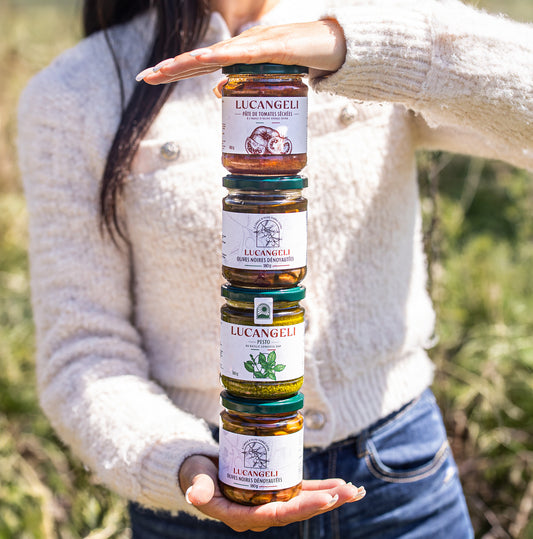Olive oil , a pillar of the Mediterranean diet , is a precious natural treasure, renowned for its many benefits for animal health . Rich in monounsaturated and polyunsaturated fatty acids, especially omega-3 , it is also an important source of vitamin E and antioxidants . These natural elements play an essential role in preventing inflammation and protecting against disease. But the benefits of this extra virgin oil , obtained by cold pressing olive seeds, are not limited to human nutrition, it also contributes to thewell-being of our animals .
The benefits of olive oil for human health
Rich in monounsaturated and polyunsaturated fatty acids, olive oil is a pillar of Mediterranean nutrition , recognized for its health benefits . Regular consumption, as shown by studies, can reduce the risk of heart problems and certain cancers, thus promoting a balanced diet . In addition to aiding digestion , it can even aid weight loss. Olive oil, rich in antioxidants , protects the body against free radical damage and supports a healthy immune system . A valuable source of vitamin E, it nourishes the skin and coat, making it an essential dietary supplement for overall health.
Olive oil for the well-being of our pets
A natural product likeolive oil is a valuable ingredient in the nutrition of our pets. Its richness in fatty acids , Omega-3 , vitamin E and antioxidants makes it an ally of choice to promote the health and well-being of our animals. Numerous scientific studies have highlighted the benefits of olive oil in animal nutrition, particularly to improve digestion , strengthen the immune system , and support metabolism .
The Benefits of Olive Oil for Dogs
Olive oil has many benefits for our dogs . Its essential fatty acid content contributes to the health of their skin and coat, while its antioxidant content helps fight inflammation, including arthritis. As a dietary supplement , olive oil promotes digestion, aids in the body's regeneration during convalescence, and prevents nutritional deficiencies. In addition, topical application of olive oil can help with skin hydration, wound healing, and parasite control, thanks to its natural components.
The Benefits of Olive Oil for Cats
Our feline friends, cats , can also enjoy the benefits of olive oil . Not only does it aid healthy digestion , but it also imparts exceptional shine and softness to the coat . Rich invitamin E and Omega-3 , it boosts immunity , and its anti-inflammatory properties can alleviate symptoms of arthritis in older cats. Used as a dietary supplement, olive oil can address nutritional deficiencies . Additionally, its topical use can treat dry lips and minor wounds, while providing protection against parasites. As strict carnivores, cats require a diet rich in fat , and olive oil, a valuable source of energy , fits this bill perfectly.
How to incorporate olive oil into our animals' diet
Olive oil , rich in fatty acids, vitamin E and antioxidants, is known for its many benefits on the health and well-being of animals. It can be easily incorporated into the food of our four-legged friends such as dogs and cats, but also more exotic animals like birds and reptiles. Simply add it to their regular diet, making sure to respect an appropriate dosage. In addition to making food tastier, olive oil contributes to better digestion, strengthens the immune system, and promotes beautiful skin and a shiny coat. In addition, according to some scientific studies, it could help reduce inflammation and arthritis in older animals.
The Proper Dosage of Olive Oil for Animals
To reap the benefits of olive oil, proper dosage is essential. Generally, one teaspoon per day is sufficient for a dog or cat. One teaspoon per week is recommended for birds. Reptiles, on the other hand, can benefit from topical application to their skin to aid in hydration. However, it's important to consult an animal health professional before adding this food to their diet to prevent deficiencies or overdoses. In any case, olive oil has proven to be a beneficial dietary supplement, promoting good health, faster recovery, and optimal regeneration.
Healthy and tasty recipes for our pets
There are several ways to incorporate olive oil into our pets' diets. It can be mixed with bird seed or added to dog and cat food. For cats and dogs, it can be combined with omega-3-rich fish to boost their energy and metabolism. Reptiles, meanwhile, will appreciate an olive oil massage, rich in antioxidants, for well-hydrated skin. Finally, olive oil can also be used in the diets of horses, chickens, sheep, goats, and ruminants. It provides them with a healthy source of energy and promotes a balanced diet, all while being a natural and organic product.
Olive oil , in addition to its many benefits for human health , also offers many benefits for the well-being of our animals . However, there are certain precautions to take when using it.
Choosing the right olive oil for your pet is crucial. Not all olive oils are created equal, and some can even be detrimental to the nutrition and health of our four-legged friends. It is recommended to choose a quality olive oil, ideally organic, that contains all the good fats necessary for a balanced diet , such as fatty acids and Omega-3s . It should also be rich in vitamin E and antioxidants to help strengthen the pet's immune system and fight inflammation, such as arthritis .
It is also important to carefully measure the amount of olive oil you give your pet. Too much can cause digestive problems. Therefore, it is best to start with small amounts and gradually increase according to your pet's tolerance. Olive oil can be added directly to your pet's food or used as a dietary supplement .
Finally, it's important to regularly monitor your pet's health when you start giving them olive oil. If your pet shows signs of discomfort or if their health deteriorates, it's recommended to consult a veterinarian.













 lucangeli.it
lucangeli.it


